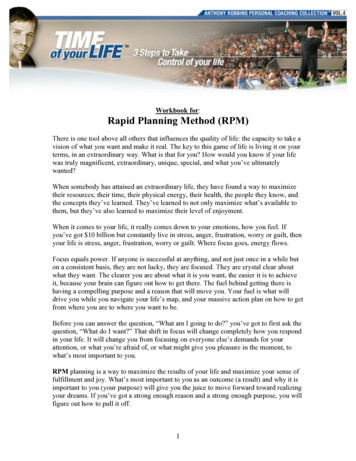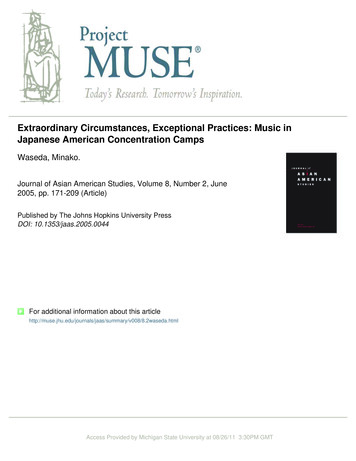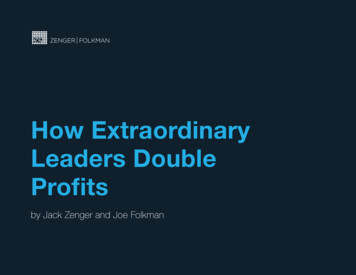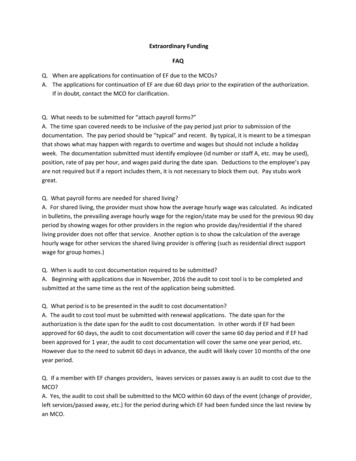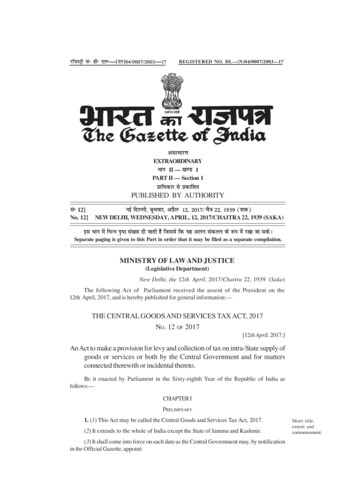
Transcription
jftLVªh lañ Mhñ ,yñ—(,u)04@0007@2003—17REGISTERED NO. x II — [k.M 1PART II — Section 1izkf/kdkj ls izdkf'krPUBLISHED BY AUTHORITYlañ 12]ubZ fnYyh] cq/kokj] vizSy 12] 2017@ pS 22] 1939 ¼'kd½No. 12]NEW DELHI, WEDNESDAY, APRIL, 12, 2017/CHAITRA 22, 1939 (SAKA)bl Hkkx esa fHkUu i "B la[;k nh tkrh gS ftlls fd ;g vyx ladyu ds :i esa j[kk tk ldsASeparate paging is given to this Part in order that it may be filed as a separate compilation.MINISTRY OF LAW AND JUSTICE(Legislative Department)New Delhi, the 12th April, 2017/Chaitra 22, 1939 (Saka)The following Act of Parliament received the assent of the President on the12th April, 2017, and is hereby published for general information:—THE CENTRAL GOODS AND SERVICES TAX ACT, 2017NO. 12 OF 2017[12th April, 2017.]An Act to make a provision for levy and collection of tax on intra-State supply ofgoods or services or both by the Central Government and for mattersconnected therewith or incidental thereto.BE it enacted by Parliament in the Sixty-eighth Year of the Republic of India asfollows:—CHAPTER IPRELIMINARY1. (1) This Act may be called the Central Goods and Services Tax Act, 2017.(2) It extends to the whole of India except the State of Jammu and Kashmir.(3) It shall come into force on such date as the Central Government may, by notificationin the Official Gazette, appoint:Short title,extent andcommencement.
2THE GAZETTE OF INDIA EXTRAORDINARY[PART II—Provided that different dates may be appointed for different provisions of this Act andany reference in any such provision to the commencement of this Act shall be construed asa reference to the coming into force of that provision.Definitions.2. In this Act, unless the context otherwise requires,––(1) “actionable claim” shall have the same meaning as assigned to it in section 3of the Transfer of Property Act, 1882;4 of 1882.(2) “address of delivery” means the address of the recipient of goods or servicesor both indicated on the tax invoice issued by a registered person for delivery of suchgoods or services or both;(3) “address on record” means the address of the recipient as available in therecords of the supplier;(4) “adjudicating authority” means any authority, appointed or authorised to passany order or decision under this Act, but does not include the Central Board of Exciseand Customs, the Revisional Authority, the Authority for Advance Ruling, the AppellateAuthority for Advance Ruling, the Appellate Authority and the Appellate Tribunal;(5) “agent” means a person, including a factor, broker, commission agent, arhatia,del credere agent, an auctioneer or any other mercantile agent, by whatever namecalled, who carries on the business of supply or receipt of goods or services or both onbehalf of another;(6) “aggregate turnover” means the aggregate value of all taxable supplies(excluding the value of inward supplies on which tax is payable by a person on reversecharge basis), exempt supplies, exports of goods or services or both and inter-Statesupplies of persons having the same Permanent Account Number, to be computed on allIndia basis but excludes central tax, State tax, Union territory tax, integrated tax and cess;(7) “agriculturist” means an individual or a Hindu Undivided Family whoundertakes cultivation of land—(a) by own labour, or(b) by the labour of family, or(c) by servants on wages payable in cash or kind or by hired labour underpersonal supervision or the personal supervision of any member of the family;(8) “Appellate Authority” means an authority appointed or authorised to hearappeals as referred to in section 107;(9) “Appellate Tribunal” means the Goods and Services Tax Appellate Tribunalconstituted under section 109;(10) “appointed day” means the date on which the provisions of this Act shallcome into force;(11) “assessment” means determination of tax liability under this Act and includesself-assessment, re-assessment, provisional assessment, summary assessment andbest judgment assessment;(12) “associated enterprises” shall have the same meaning as assigned to it insection 92A of the Income-tax Act, 1961;(13) “audit” means the examination of records, returns and other documentsmaintained or furnished by the registered person under this Act or the rules madethereunder or under any other law for the time being in force to verify the correctnessof turnover declared, taxes paid, refund claimed and input tax credit availed, and toassess his compliance with the provisions of this Act or the rules made thereunder;(14) “authorised bank” shall mean a bank or a branch of a bank authorised bythe Government to collect the tax or any other amount payable under this Act;43 of 1961.
SEC. 1]THE GAZETTE OF INDIA EXTRAORDINARY3(15) “authorised representative” means the representative as referred to insection 116;54 of 1963.(16) “Board” means the Central Board of Excise and Customs constituted underthe Central Boards of Revenue Act, 1963;(17) “business” includes––(a) any trade, commerce, manufacture, profession, vocation, adventure,wager or any other similar activity, whether or not it is for a pecuniary benefit;(b) any activity or transaction in connection with or incidental or ancillaryto sub-clause (a);(c) any activity or transaction in the nature of sub-clause (a), whether ornot there is volume, frequency, continuity or regularity of such transaction;(d) supply or acquisition of goods including capital goods and services inconnection with commencement or closure of business;(e) provision by a club, association, society, or any such body (for asubscription or any other consideration) of the facilities or benefits to its members;(f) admission, for a consideration, of persons to any premises;(g) services supplied by a person as the holder of an office which has beenaccepted by him in the course or furtherance of his trade, profession or vocation;(h) services provided by a race club by way of totalisator or a licence tobook maker in such club ; and(i) any activity or transaction undertaken by the Central Government, aState Government or any local authority in which they are engaged as publicauthorities;(18) “business vertical” means a distinguishable component of an enterprisethat is engaged in the supply of individual goods or services or a group of relatedgoods or services which is subject to risks and returns that are different from those ofthe other business verticals.Explanation.––For the purposes of this clause, factors that should be consideredin determining whether goods or services are related include––(a) the nature of the goods or services;(b) the nature of the production processes;(c) the type or class of customers for the goods or services;(d) the methods used to distribute the goods or supply of services; and(e) the nature of regulatory environment (wherever applicable), includingbanking, insurance, or public utilities;(19) “capital goods” means goods, the value of which is capitalised in the booksof account of the person claiming the input tax credit and which are used or intendedto be used in the course or furtherance of business;(20) “casual taxable person” means a person who occasionally undertakestransactions involving supply of goods or services or both in the course or furtheranceof business, whether as principal, agent or in any other capacity, in a State or a Unionterritory where he has no fixed place of business;(21) “central tax” means the central goods and services tax levied undersection 9;
4THE GAZETTE OF INDIA EXTRAORDINARY[PART II—(22) “cess” shall have the same meaning as assigned to it in the Goods andServices Tax (Compensation to States) Act;(23) “chartered accountant” means a chartered accountant as defined inclause (b) of sub-section (1) of section 2 of the Chartered Accountants Act, 1949;38 of 1949.(24) “Commissioner” means the Commissioner of central tax and includesthe Principal Commissioner of central tax appointed under section 3 and theCommissioner of integrated tax appointed under the Integrated Goods and ServicesTax Act;(25) “Commissioner in the Board” means the Commissioner referred to insection 168;(26) “common portal” means the common goods and services tax electronicportal referred to in section 146;(27) “common working days” in respect of a State or Union territory shallmean such days in succession which are not declared as gazetted holidays by theCentral Government or the concerned State or Union territory Government;(28) “company secretary” means a company secretary as defined in clause(c) of sub-section (1) of section 2 of the Company Secretaries Act, 1980;(29) “competent authority” means such authority as may be notified by theGovernment;(30) “composite supply” means a supply made by a taxable person to arecipient consisting of two or more taxable supplies of goods or services or both,or any combination thereof, which are naturally bundled and supplied in conjunctionwith each other in the ordinary course of business, one of which is a principalsupply;Illustration.— Where goods are packed and transported with insurance,the supply of goods, packing materials, transport and insurance is a compositesupply and supply of goods is a principal supply;(31) “consideration” in relation to the supply of goods or services or bothincludes––(a) any payment made or to be made, whether in money or otherwise, inrespect of, in response to, or for the inducement of, the supply of goods orservices or both, whether by the recipient or by any other person but shallnot include any subsidy given by the Central Government or a StateGovernment;(b) the monetary value of any act or forbearance, in respect of, inresponse to, or for the inducement of, the supply of goods or services orboth, whether by the recipient or by any other person but shall not includeany subsidy given by the Central Government or a State Government:Provided that a deposit given in respect of the supply of goods orservices or both shall not be considered as payment made for such supplyunless the supplier applies such deposit as consideration for the said supply;(32) “continuous supply of goods” means a supply of goods which isprovided, or agreed to be provided, continuously or on recurrent basis, under acontract, whether or not by means of a wire, cable, pipeline or other conduit, andfor which the supplier invoices the recipient on a regular or periodic basis andincludes supply of such goods as the Government may, subject to such conditions,as it may, by notification, specify;56 of 1980.
SEC. 1]THE GAZETTE OF INDIA EXTRAORDINARY5(33) “continuous supply of services” means a supply of services which isprovided, or agreed to be provided, continuously or on recurrent basis, under a contract,for a period exceeding three months with periodic payment obligations and includessupply of such services as the Government may, subject to such conditions, as it may,by notification, specify;(34) “conveyance” includes a vessel, an aircraft and a vehicle;23 of 1959.(35) “cost accountant” means a cost accountant as defined in clause (c) ofsub-section (1) of section 2 of the Cost and Works Accountants Act, 1959;(36) “Council” means the Goods and Services Tax Council established underarticle 279A of the Constitution;(37) “credit note” means a document issued by a registered person undersub-section (1) of section 34;(38) “debit note” means a document issued by a registered person undersub-section (3) of section 34;(39) “deemed exports” means such supplies of goods as may be notified undersection 147;(40) “designated authority” means such authority as may be notified by theBoard;21 of 2000.(41) “document” includes written or printed record of any sort and electronicrecord as defined in clause (t) of section 2 of the Information Technology Act, 2000;(42) “drawback” in relation to any goods manufactured in India and exported,means the rebate of duty, tax or cess chargeable on any imported inputs or on anydomestic inputs or input services used in the manufacture of such goods;(43) “electronic cash ledger” means the electronic cash ledger referred to in subsection (1) of section 49;(44) “electronic commerce” means the supply of goods or services or both,including digital products over digital or electronic network;(45) “electronic commerce operator” means any person who owns, operates ormanages digital or electronic facility or platform for electronic commerce;(46) “electronic credit ledger” means the electronic credit ledger referred to insub-section (2) of section 49;(47) “exempt supply” means supply of any goods or services or both whichattracts nil rate of tax or which may be wholly exempt from tax under section 11, orunder section 6 of the Integrated Goods and Services Tax Act, and includesnon-taxable supply;(48) “existing law” means any law, notification, order, rule or regulation relatingto levy and collection of duty or tax on goods or services or both passed or madebefore the commencement of this Act by Parliament or any Authority or person havingthe power to make such law, notification, order, rule or regulation;(49) “family” means,––(i) the spouse and children of the person, and(ii) the parents, grand-parents, brothers and sisters of the person if theyare wholly or mainly dependent on the said person;(50) “fixed establishment” means a place (other than the registered place ofbusiness) which is characterised by a sufficient degree of permanence and suitablestructure in terms of human and technical resources to supply services, or to receiveand use services for its own needs;
6THE GAZETTE OF INDIA EXTRAORDINARY[PART II—(51) “Fund” means the Consumer Welfare Fund established under section 57;(52) “goods” means every kind of movable property other than money andsecurities but includes actionable claim, growing crops, grass and things attached toor forming part of the land which are agreed to be severed before supply or under acontract of supply;(53) “Government” means the Central Government;(54) “Goods and Services Tax (Compensation to States) Act” means the Goodsand Services Tax (Compensation to States) Act, 2017;(55) “goods and services tax practitioner” means any person who has beenapproved under section 48 to act as such practitioner;(56) “India” means the territory of India as referred to in article 1 of theConstitution, its territorial waters, seabed and sub-soil underlying such waters,continental shelf, exclusive economic zone or any other maritime zone as referred to inthe Territorial Waters, Continental Shelf, Exclusive Economic Zone and other MaritimeZones Act, 1976, and the air space above its territory and territorial waters;(57) “Integrated Goods and Services Tax Act” means the Integrated Goods andServices Tax Act, 2017;(58) “integrated tax” means the integrated goods and services tax levied underthe Integrated Goods and Services Tax Act;(59) “input” means any goods other than capital goods used or intended to beused by a supplier in the course or furtherance of business;(60) “input service” means any service used or intended to be used by a supplierin the course or furtherance of business;(61) “Input Service Distributor” means an office of the supplier of goods orservices or both which receives tax invoices issued under section 31 towards thereceipt of input services and issues a prescribed document for the purposes ofdistributing the credit of central tax, State tax, integrated tax or Union territory tax paidon the said services to a supplier of taxable goods or services or both having the samePermanent Account Number as that of the said office;(62) “input tax” in relation to a registered person, means the central tax, State tax,integrated tax or Union territory tax charged on any supply of goods or services orboth made to him and includes—(a) the integrated goods and services tax charged on import of goods;(b) the tax payable under the provisions of sub-sections (3) and (4) ofsection 9;(c) the tax payable under the provisions of sub-sections (3) and (4) ofsection 5 of the Integrated Goods and Services Tax Act;(d) the tax payable under the provisions of sub-sections (3) and (4) ofsection 9 of the respective State Goods and Services Tax Act; or(e) the tax payable under the provisions of sub-sections (3) and (4) ofsection 7 of the Union Territory Goods and Services Tax Act,but does not include the tax paid under the composition levy;(63) “input tax credit” means the credit of input tax;(64) “intra-State supply of goods” shall have the same meaning as assigned toit in section 8 of the Integrated Goods and Services Tax Act;(65) “intra-State supply of services” shall have the same meaning as assigned toit in section 8 of the Integrated Goods and Services Tax Act;(66) “invoice” or “tax invoice” means the tax invoice referred to in section 31;(67) “inward supply” in relation to a person, shall mean receipt of goods orservices or both whether by purchase, acquisition or any other means with or withoutconsideration;80 of 1976.
SEC. 1]THE GAZETTE OF INDIA EXTRAORDINARY7(68) “job work” means any treatment or process undertaken by a person ongoods belonging to another registered person and the expression “job worker” shallbe construed accordingly;(69) “local authority” means––(a) a “Panchayat” as defined in clause (d) of article 243 of the Constitution;(b) a “Municipality” as defined in clause (e) of article 243P of theConstitution;(c) a Municipal Committee, a Zilla Parishad, a District Board, and any otherauthority legally entitled to, or entrusted by the Central Government or any StateGovernment with the control or management of a municipal or local fund;41 of 2006.(d) a Cantonment Board as defined in section 3 of the CantonmentsAct, 2006;(e) a Regional Council or a District Council constituted under the SixthSchedule to the Constitution;(f) a Development Board constituted under article 371 of the Constitution;or(g) a Regional Council constituted under article 371A of the Constitution;(70) “location of the recipient of services” means,—(a) where a supply is received at a place of business for which theregistration has been obtained, the location of such place of business;(b) where a supply is received at a place other than the place of businessfor which registration has been obtained (a fixed establishment elsewhere), thelocation of such fixed establishment;(c) where a supply is received at more than one establishment, whether theplace of business or fixed establishment, the location of the establishment mostdirectly concerned with the receipt of the supply; and(d) in absence of such places, the location of the usual place of residenceof the recipient;(71) “location of the supplier of services” means,—(a) where a supply is made from a place of business for which theregistration has been obtained, the location of such place of business;(b) where a supply is made from a place other than the place of businessfor which registration has been obtained (a fixed establishment elsewhere), thelocation of such fixed establishment;(c) where a supply is made from more than one establishment, whether theplace of business or fixed establishment, the location of the establishment mostdirectly concerned with the provisions of the supply; and(d) in absence of such places, the location of the usual place of residenceof the supplier;(72) “manufacture” means processing of raw material or inputs in any mannerthat results in emergence of a new product having a distinct name, character and useand the term “manufacturer” shall be construed accordingly;(73) “market value” shall mean the full amount which a recipient of a supply isrequired to pay in order to obtain the goods or services or both of like kind and qualityat or about the same time and at the same commercial level where the recipient and thesupplier are not related;(74) “mixed supply” means two or more individual supplies of goods or services,or any combination thereof, made in conjunction with each other by a taxable personfor a single price where such supply does not constitute a composite supply.Illustration.— A supply of a package consisting of canned foods, sweets,chocolates, cakes, dry fruits, aerated drinks and fruit juices when supplied for a
8THE GAZETTE OF INDIA EXTRAORDINARY[PART II—single price is a mixed supply. Each of these items can be supplied separately and isnot dependent on any other. It shall not be a mixed supply if these items are suppliedseparately;(75) “money” means the Indian legal tender or any foreign currency, cheque,promissory note, bill of exchange, letter of credit, draft, pay order, traveller cheque,money order, postal or electronic remittance or any other instrument recognised by theReserve Bank of India when used as a consideration to settle an obligation or exchangewith Indian legal tender of another denomination but shall not include any currencythat is held for its numismatic value;(76) “motor vehicle” shall have the same meaning as assigned to it in clause (28)of section 2 of the Motor Vehicles Act, 1988;59 of 1988.(77) “non-resident taxable person” means any person who occasionallyundertakes transactions involving supply of goods or services or both, whether asprincipal or agent or in any other capacity, but who has no fixed place of business orresidence in India;(78) “non-taxable supply” means a supply of goods or services or both which isnot leviable to tax under this Act or under the Integrated Goods and Services Tax Act;(79) “non-taxable territory” means the territory which is outside the taxableterritory;(80) “notification” means a notification published in the Official Gazette and theexpressions “notify” and “notified” shall be construed accordingly;(81) “other territory” includes territories other than those comprising in a Stateand those referred to in sub-clauses (a) to (e) of clause (114) ;(82) “output tax” in relation to a taxable person, means the tax chargeable underthis Act on taxable supply of goods or services or both made by him or by his agentbut excludes tax payable by him on reverse charge basis;(83) “outward supply” in relation to a taxable person, means supply of goods orservices or both, whether by sale, transfer, barter, exchange, licence, rental, lease ordisposal or any other mode, made or agreed to be made by such person in the courseor furtherance of business;(84) “person” includes—(a) an individual;(b) a Hindu Undivided Family;(c) a company;(d) a firm;(e) a Limited Liability Partnership;(f) an association of persons or a body of individuals, whether incorporatedor not, in India or outside India;(g) any corporation established by or under any Central Act, State Act orProvincial Act or a Government company as defined in clause (45) of section 2 ofthe Companies Act, 2013;(h) any body corporate incorporated by or under the laws of a countryoutside India;(i) a co-operative society registered under any law relating to co-operativesocieties;18 of 2013.
SEC. 1]THE GAZETTE OF INDIA EXTRAORDINARY9(j) a local authority;(k) Central Government or a State Government;21 of 1860.(l) society as defined under the Societies Registration Act, 1860;(m) trust; and(n) every artificial juridical person, not falling within any of the above;(85) “place of business” includes––(a) a place from where the business is ordinarily carried on, and includes awarehouse, a godown or any other place where a taxable person stores hisgoods, supplies or receives goods or services or both; or(b) a place where a taxable person maintains his books of account; or(c) a place where a taxable person is engaged in business through anagent, by whatever name called;(86) “place of supply” means the place of supply as referred to in Chapter V ofthe Integrated Goods and Services Tax Act;(87) “prescribed” means prescribed by rules made under this Act on therecommendations of the Council;(88) “principal” means a person on whose behalf an agent carries on the businessof supply or receipt of goods or services or both;(89) “principal place of business” means the place of business specified as theprincipal place of business in the certificate of registration;(90) “principal supply” means the supply of goods or services which constitutesthe predominant element of a composite supply and to which any other supply formingpart of that composite supply is ancillary;(91) “proper officer” in relation to any function to be performed under this Act,means the Commissioner or the officer of the central tax who is assigned that functionby the Commissioner in the Board;(92) “quarter” shall mean a period comprising three consecutive calendar months,ending on the last day of March, June, September and December of a calendar year;(93) “recipient” of supply of goods or services or both, means—(a) where a consideration is payable for the supply of goods or services orboth, the person who is liable to pay that consideration;(b) where no consideration is payable for the supply of goods, the personto whom the goods are delivered or made available, or to whom possession oruse of the goods is given or made available; and(c) where no consideration is payable for the supply of a service, theperson to whom the service is rendered,and any reference to a person to whom a supply is made shall be construed as areference to the recipient of the supply and shall include an agent acting as such onbehalf of the recipient in relation to the goods or services or both supplied;(94) “registered person” means a person who is registered under section 25 butdoes not include a person having a Unique Identity Number;(95) “regulations” means the regulations made by the Board under this Act onthe recommendations of the Council;(96) “removal’’ in relation to goods, means—
10THE GAZETTE OF INDIA EXTRAORDINARY[PART II—(a) despatch of the goods for delivery by the supplier thereof or by anyother person acting on behalf of such supplier; or(b) collection of the goods by the recipient thereof or by any other personacting on behalf of such recipient;(97) “return” means any return prescribed or otherwise required to be furnishedby or under this Act or the rules made thereunder;(98) “reverse charge” means the liability to pay tax by the recipient of supply ofgoods or services or both instead of the supplier of such goods or services or bothunder sub-section (3) or sub-section (4) of section 9, or under sub-section (3) or subsection (4) of section 5 of the Integrated Goods and Services Tax Act;(99) “Revisional Authority” means an authority appointed or authorised forrevision of decision or orders as referred to in section 108;(100) “Schedule” means a Schedule appended to this Act;(101) “securities” shall have the same meaning as assigned to it in clause (h) ofsection 2 of the Securities Contracts (Regulation) Act, 1956;(102) “services” means anything other than goods, money and securities butincludes activities relating to the use of money or its conversion by cash or by anyother mode, from one form, currency or denomination, to another form, currency ordenomination for which a separate consideration is charged;(103) “State” includes a Union territory with Legislature;(104) “State tax” means the tax levied under any State Goods and Services TaxAct;(105) “supplier” in relation to any goods or services or both, shall mean theperson supplying the said goods or services or both and shall include an agentacting as such on behalf of such supplier in relation to the goods or services or bothsupplied;(106) “tax period” means the period for which the return is required to be furnished;(107) “taxable person” means a person who is registered or liable to be registeredunder section 22 or section 24;(108) “taxable supply” means a supply of goods or services or both which isleviable to tax under this Act;(109) “taxable territory” means the territory to which the provisions of this Actapply;(110) “telecommunication service” means service of any description (includingelectronic mail, voice mail, data services, audio text services, video text services,radio paging and cellular mobile telephone services) which is made available tousers by means of any transmission or reception of signs, signals, writing,images and sounds or intelligence of any nature, by wire, radio, visual or otherelectromagnetic means;(111) “the State Goods and Services Tax Act” means the respective State Goodsand Services Tax Act, 2017;(112) “turnover in State” or “turnover in Union territory” means the aggregatevalue of all taxable supplies (excluding the value of inward supplies on which tax ispayable by a person on reverse charge basis) and exempt supplies made within a Stateor Union territory by a taxable person, exports of goods or services or bothand inter-State supplies of goods or services or both made from the State or Unionterritory by the said taxable person but excludes central tax, State tax, Union territory42 of 1956.
SEC. 1]THE GAZETTE OF INDIA EXTRAORDINARY11tax, integrated tax and cess;(113) “usual place of residence” means––(a) in case of an individual, the place where he ordinarily resides;(b) in other cases, the place where the person is incorporated or otherwiselegally constituted;(114) “Union territory” means the territory of—(a) the Andaman and Nicobar Islands;(b) Lakshadweep;(c) Dadra and Nagar Haveli;(d) Daman and Diu;(e) Chandigarh; and(f) other territory.Explanation.––For the purposes of this Act, each of the territories specifiedin sub-clauses (a) to (f) shall be considered to be a separate Union territory;(115) “Union territory tax” means the Union territory goods and services taxlevied under the Union Territory Goods and Services Tax Act;(116) “Union Territory Goods and Services Tax Act” means the Union TerritoryGoods and Services Tax Act, 2017;(117) “valid return” means a return furnished under sub-section (1) of section 39on which self-assessed tax has been paid in full;(118) “voucher” means an instrument where there is an obligation to accept it asconsideration or part consideration for a s
4 THE GAZETTE OF INDIA EXTRAORDINARY [P ART II— (22) "cess" shall have the same meaning as assigned to it in the Goods andServices Tax (Compensation to States) Act; (23) "chartered accountant" means a chartered accountant as defined inclause (b) of sub-section (1) of section 2 of the Chartered Accountants Act, 1949;(24) "Commissioner" means the Commissioner of central tax and .


